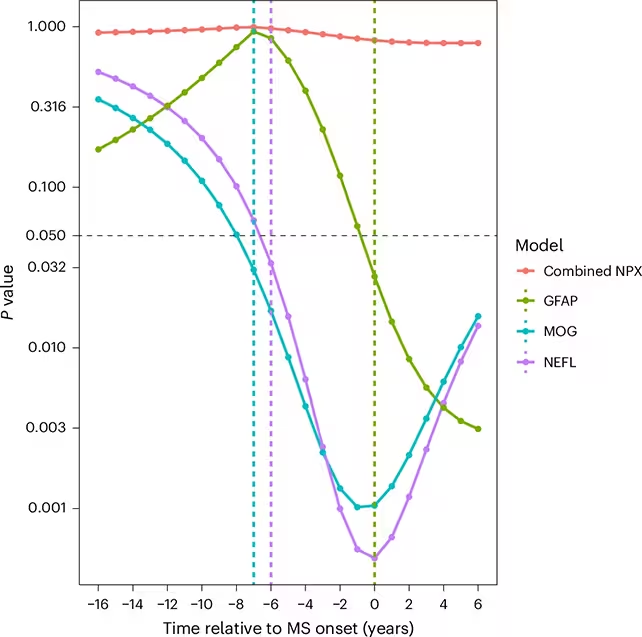5 Minutes
Researchers have identified a pattern of blood proteins that may signal multiple sclerosis (MS) up to seven years before clinical symptoms appear. This discovery could open a new window for early diagnosis, disease monitoring, and preventive strategies for a condition that often progresses long before patients notice anything wrong.
How the study uncovered early warning signs
Scientists at the University of California, San Francisco (UCSF) analyzed archived blood samples from US military personnel to look for presymptomatic biomarkers of MS. From a pool of more than 5,000 proteins, the team tracked changes in people who later received an MS diagnosis. The study group included 134 service members who developed MS and a much larger control group.
The researchers focused on proteins linked to myelin integrity, nerve damage, and immune signaling. By comparing protein levels across time points before diagnosis, they mapped a sequence of biological events that appears to unfold years ahead of clinical onset.
Key findings: a timeline of early damage
Among the most striking results, myelin oligodendrocyte glycoprotein (MOG) rose sharply on average seven years before symptoms. MOG is part of the protective myelin sheath that insulates nerve fibers; its early elevation suggests immune targeting of myelin long before people report neurological problems. Around six years before symptoms, neurofilament light chain (NfL) also increased — a well-established marker of axonal injury that signals nerve fiber damage.
Chemical messengers were implicated too. Interleukin-3 (IL-3), which helps recruit immune cells, was elevated ahead of symptom onset, indicating that immune activation accompanies the tissue changes observed in MOG and NfL.

Certain proteins were at unusually high levels several years ahead of MS symptoms. (Abdelhak et al., Nat. Med., 2025)
By combining 21 of the most predictive proteins into a panel, the study authors propose that a blood-based test could one day identify people with presymptomatic MS. Such a biomarker panel would need validation in larger, more diverse populations, but the idea is promising: a routine blood test that flags elevated risk years before standard diagnosis.
Why this matters: earlier treatment and better outcomes
MS is a chronic autoimmune disease that attacks the central nervous system, causing a mix of mobility, vision, cognitive, mood, and pain problems. Clinicians often only diagnose MS after symptoms emerge, by which point damage may already be substantial. Detecting the disease earlier could allow clinicians to intervene sooner, potentially slowing progression or preventing cumulative injury.
"We think our work opens numerous opportunities for diagnosing, monitoring, and possibly treating MS," said neurologist Ahmed Abdelhak from UCSF. "It could be a game-changer for how we understand and manage this disease." Ari Green, also at UCSF, added that recognizing MS as a process that begins years before clinical onset creates new opportunities to protect patients from further injury.
Limitations and next steps
Important caveats remain. The current study used samples from military recruits — a relatively specific population — and included a modest number of eventual MS cases. MS progression and timelines vary between individuals, influenced by genetics, environment, and lifestyle. Larger studies across diverse cohorts are necessary to validate any blood test and to understand how early biomarkers relate to long-term outcomes.
Future research will also need to determine whether interventions triggered by early detection actually change the course of disease. Can we prevent conversion to symptomatic MS, or meaningfully delay disability? That’s the question clinicians and researchers will pursue next.
Potential impact on research and care
Beyond a screening test, these findings help clarify disease biology: the sequence suggests myelin-targeting may precede direct nerve damage, with immune signals bridging the two. That timeline could guide therapeutic development, focusing on protective strategies for myelin and early modulation of immune activity.
Expert Insight
"This study reframes MS as a long-term, evolving process rather than a sudden-onset illness," explains Dr. Maya Patel, neurologist and MS researcher. "If validated, a protein panel for presymptomatic MS could shift care from reactive to proactive — screening high-risk individuals and testing preventive approaches. But we must move carefully: detecting risk is only useful if we have safe, effective ways to act on that information."
Overall, the UCSF-led work offers a compelling proof of concept: blood-based signals can precede MS symptoms by years. As validation studies proceed, patients and clinicians may one day have tools to detect and potentially intervene in MS long before the first clinical sign appears.
Source: sciencealert
Comments
bioLumen
Wow, if a simple blood test could flag MS years early that would be huge! Imagine preventing damage before symptoms. Hope they test diverse groups soon
netqube
Is this even real? 7 years before symptoms sounds wild... how do they rule out other causes, and the military sample worries me. Need big validation, tbh


Leave a Comment